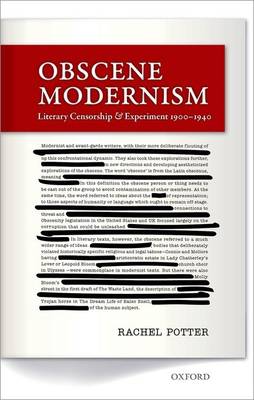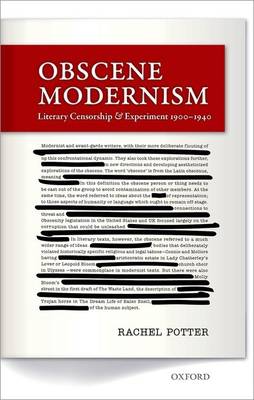
En raison d'une grêve chez bpost, votre commande pourrait être retardée. Vous avez besoin d’un livre rapidement ? Nos magasins vous accueillent à bras ouverts !
- Retrait gratuit dans votre magasin Club
- 7.000.000 titres dans notre catalogue
- Payer en toute sécurité
- Toujours un magasin près de chez vous
En raison de la grêve chez bpost, votre commande pourrait être retardée. Vous avez besoin d’un livre rapidement ? Nos magasins vous accueillent à bras ouverts !
- Retrait gratuit dans votre magasin Club
- 7.000.0000 titres dans notre catalogue
- Payer en toute sécurité
- Toujours un magasin près de chez vous
175,95 €
+ 351 points
Description
During the period 1900-1940 novels and poems in the UK and US were subject to strict forms of censorship and control because of their representation of sex and sexuality. At the same time, however, writers were more interested than ever before in writing about sex and excrement, incorporating obscene slang words into literary texts, and exploring previously uncharted elements of the modern psyche. This book explores the far-reaching literary, legal and philosophical consequences of this historical conflict between law and literature. Alongside the famous prosecutions of D. H. Lawrence's The Rainbow and James Joyce's Ulysses huge numbers of novels and poems were altered by publishers and printers because of concerns about prosecution. Far from curtailing the writing of obscenity, however, censorship seemed to stimulate writers to explore it further. During the period covered by this book novels and poems became more experimentally obscene, and writers were intensely interested in
discussing the author's rights to free speech, the nature of obscenity and the proper parameters of literature. Literature, seen as a dangerous form of corruption by some, was identified with sexual liberation by others. While legislators tried to protect UK and US borders from obscene literature, modernist publishers and writers gravitated abroad, a development that prompted writers to defend the international rights of banned authors and books. While the period 1900-1940 was one of the most heavily policed in the history of literature, it was also the time when the parameters of literature opened up and writers seriously questioned the rights of nation states to control the production and dissemination of literature.
discussing the author's rights to free speech, the nature of obscenity and the proper parameters of literature. Literature, seen as a dangerous form of corruption by some, was identified with sexual liberation by others. While legislators tried to protect UK and US borders from obscene literature, modernist publishers and writers gravitated abroad, a development that prompted writers to defend the international rights of banned authors and books. While the period 1900-1940 was one of the most heavily policed in the history of literature, it was also the time when the parameters of literature opened up and writers seriously questioned the rights of nation states to control the production and dissemination of literature.
Spécifications
Parties prenantes
- Auteur(s) :
- Editeur:
Contenu
- Nombre de pages :
- 247
- Langue:
- Anglais
Caractéristiques
- EAN:
- 9780199680986
- Date de parution :
- 22-10-13
- Format:
- Livre relié
- Format numérique:
- Genaaid
- Dimensions :
- 218 mm x 145 mm
- Poids :
- 422 g

Les avis
Nous publions uniquement les avis qui respectent les conditions requises. Consultez nos conditions pour les avis.






